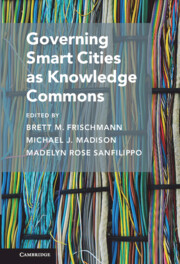Governing Smart Cities as Knowledge Commons
The rise of “smart” – or technologically advanced – cities has been well documented, while governance of such technology has remained unresolved. Integrating surveillance, AI, automation, and smart tech within basic infrastructure as well as public and private services and spaces raises a complex set of ethical, economic, political, social, and technological questions. The Governing Knowledge Commons (GKC) framework provides a descriptive lens through which to structure case studies examining smart tech deployment and commons governance in different cities. This volume deepens our understanding of community governance institutions, the social dilemmas communities face, and the dynamic relationships between data, technology, and human lives. For students, professors, and practitioners of law and policy dealing with a wide variety of planning, design, and regulatory issues relating to cities, these case studies illustrate options to develop best practice. Available through Open Access, the volume provides detailed guidance for communities deploying smart tech.
Brett M. Frischmann is Charles Widger Endowed University Professor in Law, Business and Economics at Villanova University.
Michael J. Madison is Senior Scholar with the University of Pittsburgh Institute for Cyber Law, Policy, and Security, and Faculty Director of the Future Law Project and a John E. Murray Faculty Scholar at the University of Pittsburgh School of Law.
Madelyn Rose Sanfilippo is Assistant Professor in the School of Information Sciences, University of Illinois at Urbana-Champaign.

